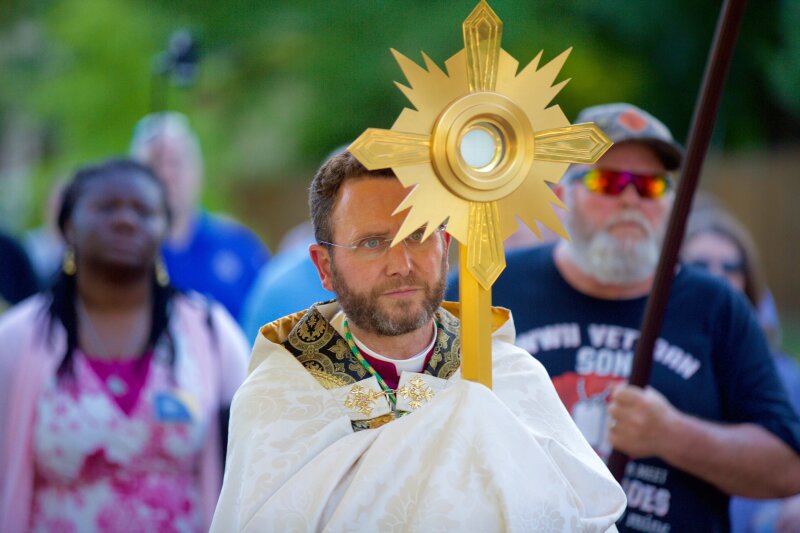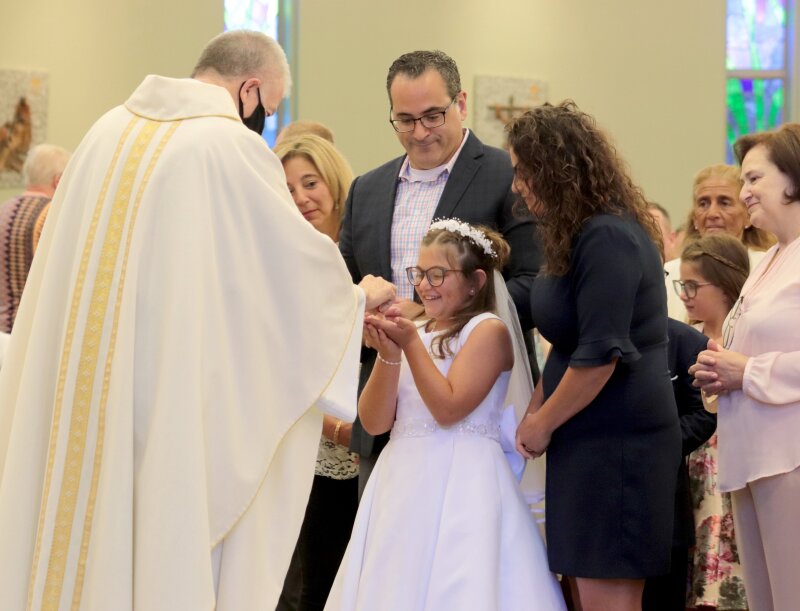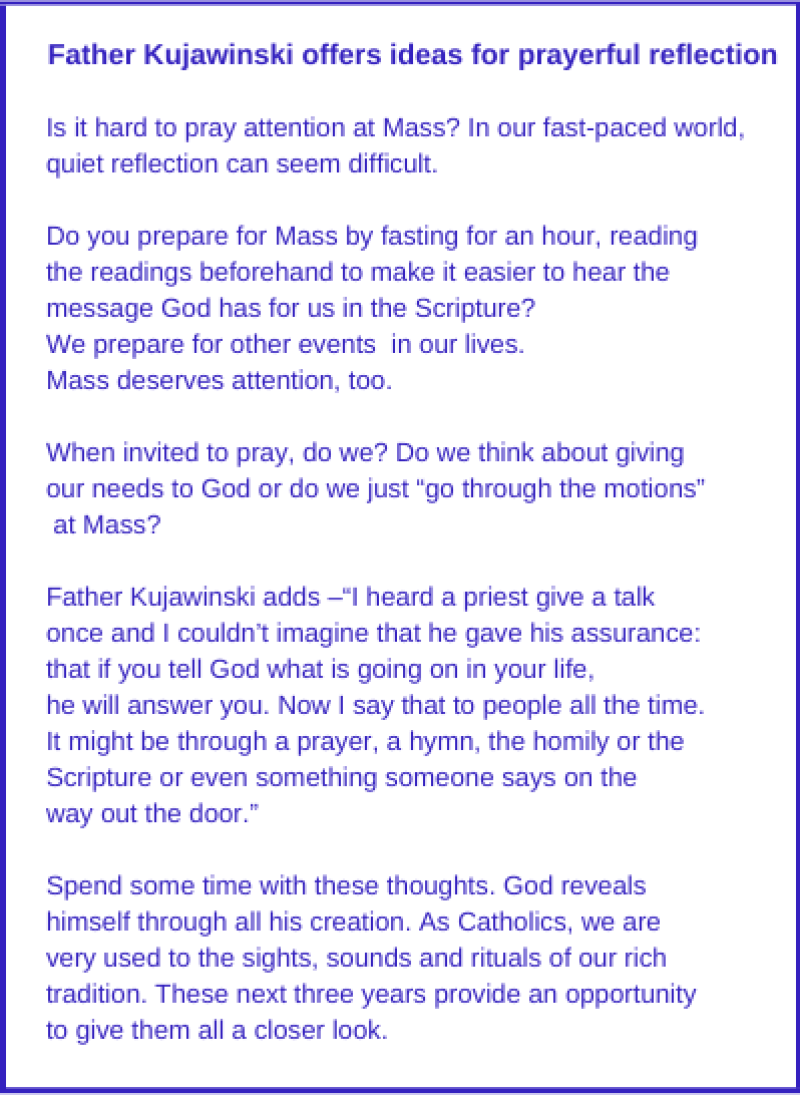
'SOURCE AND SUMMIT' OF THE CATHOLIC FAITH IS FOCUS OF REVIVAL
Sheila Grove
04/22/2022
"I am the living bread that came down from heaven; whoever eats this bread will live forever; and the bread that I will give is my flesh for the life of the world."
John 6:51
NORTHWEST PA — Catholics throughout the United States are invited to participate in a three-year journey to the “source and summit” (CCC§1034) of the Catholic faith — a Eucharistic Revival — planned to awaken the faithful to the truth and beauty of the Holy Eucharist.

Bishop Andrew H. Cozzens of Crookston, Minnesota, carries
the Eucharist in a monstrance during a procession, June 19,
2021. Photo/Dave Hrbacek, The Catholic Spirit
“It’s an invitation to every institution, every family, parish and school to inflame again a relationship with the Lord and the Eucharist,” says Father Matt Kujawinski, administrator of the Office of Worship of the Diocese of Erie.
The revival was prompted in part by a well-known Pew Research Center report published in 2019 that indicated that approximately two-thirds of American Catholics do not believe that the Eucharist is the real presence of Jesus Christ. Despite some concerns about design flaws in the survey, the data indicates that the number of Catholics disengaged from the heart of Catholicism is of epic proportion.
“When you see that so many Catholics do not believe in the real presence, it goes right back to our formation,” says Bishop Lawrence Persico. “If we were properly formed, then we would understand that the church has always taught that at the Mass, the bread and wine become the real body and blood of Christ. It’s unfortunate that so many people just think it’s symbolic. Jesus said, ‘This is my body, this is my blood.’ And we as a matter of faith, believe those words. The Eucharist is the actual presence of Christ.”
“Christ is present to us in a very real way in the Eucharist. It is a great gift that he has given us. The night before he died, he gave us himself to be with us always. Any time we attend Mass and receive the Eucharist, we are receiving that gift. Every time we celebrate Mass, we renew that relationship with Christ,” Bishop Persico added.
Bishops in the United States began making plans to address this fundamental issue in a substantive way just prior to the pandemic. The lack of ability to receive the Eucharist intensified the fervor of many Catholics. The fact that for others it exacerbated their indifference to the sacrament, highlighted the urgent need for catechesis.

in her hand during her first Communion at Blessed Sacrament
Catholic Church in Morton, Ill., June 13, 2020.
CNS photo/Jennifer Willems, The Catholic Post
The bishops revisited the issue at their spring and fall meetings in 2021. They have since published a document, The Mystery of the Eucharist in the Life of the Church and have designed a transformative experience for all Catholics.
Bishop Andrew Cozzens, of the Diocese of Crookston, Minnesota, and chairman of the Committee on Evangelization and Catechesis, is spearheading the movement that will span three years and culminate in a national Eucharistic Congress, July 17-21, 2024, in Indianapolis, Indiana. The congress will be the first gathering of its kind in almost 50 years in the U.S. The bishops are hopeful that nearly 100,000 people will “come together to study, pray and worship and then be charged to live their faith in an intentional missionary way,” says Bishop Cozzens in a video produced by the USCCB.
The three-year revival begins on June 19 with Eucharistic processions in dioceses across the country. In these traditional expressions of faith, the Blessed Sacrament leads the procession and is carried under a canopy consistent with the way the Lord traveled in the Ark of the Covenant when carried by the Israelites.
“The canopy is a sign that the Lord is present,” says Father Kujawinski. “The people follow behind, just as we follow the Lord. It is a microcosm of our faith. Accompanied by music, it is clearly a cause for celebration.”
Bishop Persico highlights the importance of gathering. “It’s about community,” he says. “We are a church; we are not just individuals. We are members of the body of Christ. When we come together for a procession, it’s a sign of our faith in the Eucharist. As a church, we gather around our risen Lord to participate and to proclaim to others that this is Christ, and we worship him.”
Father Kujawinski adds, “Oftentimes, through familiarity,
we take things for granted. This three-year period is an opportunity
to renew our belief in the Eucharist and what this great gift means
for us. It is obvious that, as Catholics, we need a revival to inspire
us to relearn, rediscover and plunge deeper into the mystery of
the Lord’s presence.”
Because the Diocese of Erie is geographically vast,
processions will be offered by St. Peter Cathedral, Erie; Notre
Dame Parish, Hermitage; St. Catherine of Siena Parish, DuBois
and St. Bernard Parish, Bradford, on June 19. Each will begin
at 1 pm rain or shine. Event-specific information will be available
closer to the date in diocesan media and parish websites and
bulletins.
Bishop Persico has asked that each parish also plan to
host a votive weekend to the Eucharist in October with preaching
and other celebrations. Additional local events will be scheduled
as well during this first year of diocesan focus with renewed
attention to adoration and exposition of the Blessed Sacrament,
40 hours celebrations and prayer.
Education and faith formation programs within parishes
and small groups focused on catechesis about the mystery of
the Holy Eucharist will highlight the second year. Father Kujawinski encourages sharing suggestions for celebrations with the Office
of Worship and the Office of Communications.
Find the USCCB’s report, The Mystery of the Eucharist in the Life of the Church, that outlines Catholic teaching on the Eucharist as sacrifice, Holy Communion and a Mystery to be lived here.
-
